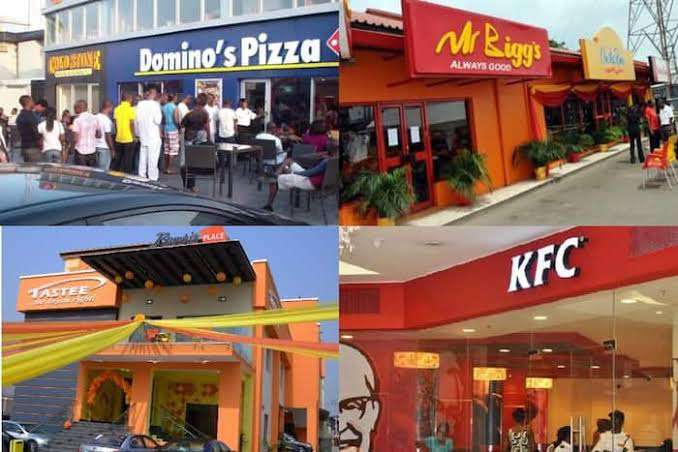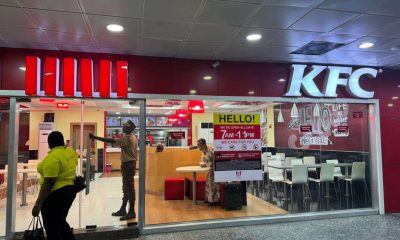Business
Eateries reel under harsh economic conditions – Adopt survival strategies

By AYOOLA OLAOLUWA
The harsh economic situation in the country has forced many fast food outlets to embarked on desperate innovations and survival strategies to stay afloat, Business Hallmark findings have revealed.
The economic downturn had forced many Nigerians, particularly low and middle-income earners, to adjust their lifestyles and tastes in order to survive.
The adjustments in tastes and lifestyles, meanwhile, has negatively affected the profitability and continued existence of eateries patronised by Nigerians during the boom period with the industry one of the worst hit.
Gone are the days when the cosy ambience of outlets in strategic locations in Lagos and major cities across the country used to be a bee-hive of activities, especially during festivities, as Nigerians thronged such places with families and friends. Then, a series of marketing promos and the aroma and taste of their local and foreign dishes, pizza, chicken, chips and other tantalising pastries showed that operators of the fast food outlets were having a swell time.
However, checks revealed that while many eateries have closed down, those still operating are facing hard times. The hitherto bubbling eateries across Lagos are now ghosts of their former selves, as their patrons have thinned out.
According to BH investigation, many Nigerians now visit local restaurants, popularly called “mama-put” for their meals in their bid to cut cost.
An operator, who spoke with BH blamed the development on low patronage, poor power supply, and astronomical rise in prices of diesel and foodstuffs and other items.
Two major outlets on the popular Isaac John Street, Ikeja GRA, Kentucky Fried Chicken (KFC) and Bacillus have closed down, despite their proximity to the rich and mighty in the highbrow area.
The hitherto bubbling outlets are devoid of activities during BH’s visit. Security men guarding the buildings, while speaking with our correspondent, confirmed that the firms had closed down and that they were only there to ensure that the properties and equipment are not vandalized.
Badly affected is also Mr. Bigg’s, one of Nigeria’s first chain of fast food restaurants owned by conglomerate, United African Company of Nigeria PLC.
When the business was thriving, UACN had over 170 locations in Nigeria. But the outfit has suspended operation in over 80 of 170 outlets, while the remaining are struggling to keep their heads above the water.
The Quick Service Restaurant (QSR), which transformed from Kingsway Rendezvous to Mr. Bigg’s in 1986, has closed its outlets on Iju Road, Iyana-ipaja Roundabout, Odo Eran in Agege, Ijaiye and Alagbado in Lagos; Ibara, Abeokuta, Ogun; Fajuyi Roundabout, Ado-Ekiti and Azikiwe Road, Aba, Abia State, among others.
The remaining restaurants, modelled after McDonalds, which began operations using two floors have limited their operations to a floor. Other operators that have gone into extinction are King George, Oworonsoki; Bumfy Burger, Soluyi, Gbagada; Golden Gate Restaurant, Ikoyi, all in Lagos.
While some have gone into extinction, outfits such as Tastee Fried Chicken, Tantalizers and Sweet Sensation, among others, are still hanging on but with difficulty. The story is also different today for Sweet Sensation, which started ‘African Meal’ that attracted several thousands of patrons.
From about 60 outlets across the country, especially the South-West, about 20 remain and are struggling to survive competition, hoping that they will regain their customers back when the economy bounced back.
A sources close to the proprietor of Sweet Sensation told BH that traditional restaurants, popularly called ‘Mama Put’ in local parlance are the biggest threat to operators of fast food joints.
“It is a growing trend, which is changing the face of Quick Service Restaurant (QSR). The traditional restaurants are fast taking over and sharing the market share of the standard QSR.
“Some of the local operators process local soup from various cultural background, which leaves taste of originality in the mouth of consumers. They offer eba, semovita, pounded yam, Ofada rice, and moin-moin at very cheaper rate because of their low running cost.
“They also serve different kinds of soup, such as efo riro, Edika Ikong, oha soup and so on to lure consumers of standard QSRs.
“As if that is not enough cause for concern, many consumers are increasingly becoming conscious of the dangers of eating processed foods, a development that has put the fast food business under threat”, the source said.
However, while other fast food outlets are barely hanging on, Chicken Republic seemed to be doing well.
When BH visited the firm’s outlets located at Ikeja City Mall, Ojodu and Abule-Egba in the course of writing this story, the joints were filled to the brim with customers who jostle to purchase one product or the other.
At the Abule-Egba joint, it took a customer an average of 15 minutes to get his order served. Despite that, customers kept trooping in.
However, an Express kiosks outside the main hall was seen attending to people buying only pastries like meat and chicken pies, burgers and sausage rolls. While those in need of dishes like jollof and fried rice had no option but to enter the main hall.
It was, however, a different stroke for Sweet Sensation, just a stone-throw from Chicken Republic, as the outlet located inside a large filling station on the popular Lagos-Abeokuta Expressway was devoid of activities.
Only five customers were observed eating their meals or came in to buy takeaway packs during the 20 minutes our correspondent stayed in the restaurant.
Sweet Sensation outlets in Ogba and Olowo-Ira, off Berger, were, however, better off as appreciable customers troop in and out to purchase their meals.
Other fast food joints like Tantalizers and Tastee Fried Chicken (TFC) are also facing hard times. Tantalizer’s outlet on the popular Ijaiye Road, Ogba Bus-Stop, was its old self when BH visited during the week.
Right from the entrance, evidence of a business in distress was evidence to even the most unobservant visitor.
Commercial drivers driving yellow danfo buses and tricycles have turned the entrance to the facility into a major car park, with the eatery’s patrons, especially those that came with their own vehicles, finding it difficult to have access.
The first floor of the building, as well as more than half of the ground floor had been partitioned and rented out to commercial tenants like phone sellers.
However, managements of some of the eateries have introduced several innovations and marketing techniques in order to attract more customers.
Some of the innovations include the setting up of street kiosks and the introduction of cheaper and smaller packs to boost sales.
Firms that have already adopted the Express Kiosks innovation include Mr. Biggs, Chicken Republic and Sweet Sensation.
BH checks revealed that the small, stand-alone booth-like kiosks are placed in conspicuous areas with high foot traffic like filling stations, estate gates and motor parks.
According to a marketing and brands consultant, Emenike Orji, the strategy is a type of direct, but low-cost business strategy in which QSRs take their products directly to their customers.
“The outlets, known as Express Kiosks, have several advantages. One, they take their products directly to their customers. You can’t but fail to see them as they are majorly located in crowded areas, such as gas and filling stations, schools and estates entrances, motor parks and major street junctions.
“Secondly, operators are spared the huge operational costs they would have incurred setting up big structures that come with necessary infrastructure like parking spaces, huge generators to power utilities such as air-conditioners, as well as convenience, including toilets.
“What normally happens is that the foods and pastries are produced in one location and transported to these kiosks at very minimal cost.
“No need for big and well equipped kitchens, no air-conditioners, furniture, security guards and parking lots. They often rent small spaces from their hosts and their customers are eligible to use the facilities constructed by their hosts.
They also cut down on the huge cost of providing power as the kiosks can be powered by smaller petrol generators”, noted Orji.
Fast food joints are also introducing cheaper and smaller packs that are affordable to Nigerians. For instance, Mr. Biggs and Tantalizers now offer cheap meals that are as low as N900.
For instance, a small pack of either jollof or fried rice with 1/8 piece of grilled chicken is sold at the flat rate of N900 by Tantalizers and Mr. Biggs.
Also, Chicken Republic offers cheap pastries to customers at its kiosks scattered across the country. For instance, the operator’s chicken and meat pies go for as low as N350, while sausage rolls sell for N300.
A consumer expert and Faculty Director at the Lagos Business School (LBS), Uchenna Uzo, said many Fast-Moving Consumer Goods (FMCGs) are packaging their products into smaller bits to make it easier for hawking, adding that restaurants are late in the game.
“The power of selling-on-the-go makes you more accessible to the end consumer, it helps you to break down what you are offering in smaller sizes that people can afford,” said Uzo.
The LBS don disclosed that the kiosks give immediate market information on the products people frequently buy, the size, package, as well as the quantity they want.
“It also helps in price testing like what proportion, menu, the right price point that people are willing to pay for among others as well as brand visibility”, he said.
In his own response. a consumer analyst at United Capital Plc, Ayorinde Akinloye, said QSRs are going retail as much as possible to offer more products and services.
“There is also the need to go beyond the mega outlets because it is expensive and difficult to run. It is cheaper to run small kiosks,” Akinloye said.





